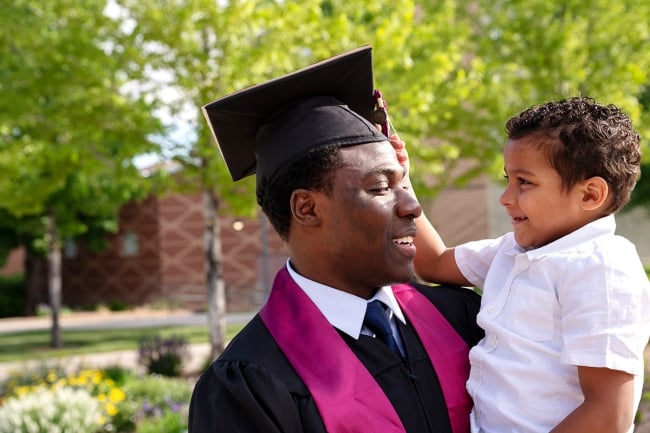You have /5 articles left.
Sign up for a free account or log in.

Roughly 30 percent of parenting students are also fathers.
grandriver/iStock/Getty Images
About 20 percent of college students are also parents. And although that statistic may invoke images of a mother trying to balance coursework with the responsibility of parenthood, in reality about 30 percent of parenting students are fathers.
However, social stigma and ingrained cultural and gender norms often stand in the way of student fathers’ academic success, according to a report released Thursday by Generation Hope, an organization focused on empowering student parents.
“The student-father narrative is not uplifted,” said Brittani Williams, Generation Hope’s director of advocacy policy and research and author of the report. “But we recognized that there are specific supports that fathers may need in terms of creating safe spaces to overcome that stigma of being a father and being a student. The emotional aspects of being a parent manifest differently for fathers than … for mothers.”
All student parents face challenges—such as a lack of financial resources, time and emotional support—that make it difficult to attain a college degree or credential, but the report notes that fathers stop out at even higher rates than mothers.
Forty-eight percent of student mothers stop out of college before completing a degree, while 61 percent of fathers stop out, according to a 2019 report from the Institute for Women’s Policy Research. Those stop-out rates are even higher for Black and Hispanic student fathers, with 72 percent and 66 percent, respectively, leaving college with no credential.
To find out more about how colleges and policymakers can address the specific barriers student fathers face in higher education, Williams conducted multiple focus groups last spring with about 15 fathers who are current students and recent graduates.
“Historically, the student-parent population has been unsupported as a whole,” Williams said, noting that researchers often refer to student parents as an “invisible population” of college students. For example, the costs of childcare keep rising, but campus-level childcare options have declined over the past 20 years: 43 percent of public colleges had on-campus childcare in 2022 compared to 60 percent in 2004, according to the Hope Center at Temple University, which conducts research about students’ basic needs.
Additionally, research about child development often focuses on mothers as caregivers, excluding “men from conversations around caregiving and improving conditions for students who are attending school while raising children,” according to Generation Hope’s report.
And leaving fathers out of conversations about the effects of the lack of support “can impact their own self-image and worth,” the report said.
‘Am I Doing Enough?’
One student father in the focus group said people confused him for a babysitter. Another father said he had to prioritize finding employment that worked with his child’s schedule before figuring out his course schedule. A third said, “I always wonder, ‘Am I doing enough?’”
Many said they felt they didn’t get enough credit for the work they were putting in to secure a long-term, stable career through a college education.
“It’s hard for me to acknowledge anything positive I’ve [accomplished],” said one student father.
Black fathers, especially, are also burdened by pervasive stereotypes that they aren’t involved in their children’s lives, when in reality the majority of Black fathers are more active in their children’s lives compared to fathers of other races, according to a 2013 report from the Centers for Disease Control and Prevention.
“Student fathers are the invisible of the invisible population,” Williams said, “because they don’t have some of the same access” to support as mothers, who are often the targets of marketing and outreach campaigns designed to support student parents.
The City University of New York’s Fatherhood Academy is one of a handful of programs in the country that specifically support student fathers. Since launching in 2012, it’s helped roughly 1,400 fathers, mostly Black and Hispanic first-generation students, earn their GEDs and figure out how higher education can help them reach their goals as parents.
The program connects students with mentors, counselors and scholarship opportunities as well as immediate material support, such as food vouchers, stipends, transit cards, diapers, strollers and available government benefits.
“A lot of our guys want immediate gains—they want to work and want to contribute financially,” said Raheem Brooks, program director of the Fatherhood Academy at LaGuardia Community College, who added that the college often advertises the program on Craigslist and other places where fathers may go to search for work.
“They come in with one goal, to get their GED and get work, but then they realize they can do more than just a GED and can take care of their family in the long term with a career that allows for more growth.”
The program also offers emotional support for student fathers, who are often conditioned not to ask for help.
“The key is to create an environment of trust, where they can be themselves and tell us what they need. They just want to be checked on and be heard,” Brooks said, noting that having that support better equips fathers for success in college, in turn making them stronger role models for their children. “At the end of the day it’s about the children. It’s about generational change.”
Policy Recommendations
Beyond more institutional acknowledgment and investment in student parents, especially efforts tailored toward fathers, Generation Hope’s report also recommends a more inclusive approach from state and federal policies. “Student parents are both mothers and fathers,” Williams said. “And student fathers need a space at the table.”
Specifics suggestions include increasing funding for the federal Child Care Access Means Parents in School program and “ensuring that grant recipients can utilize dollars in a way that supports the fathers on their campuses.” The report also recommends collecting more federal and state-level data about the experiences of student parents, especially student fathers; improving basic needs support for all college students; and expanding the federal Child Care and Development fund and allowing states more flexibility in how the money can be used.
Mark Huelsman, director of policy and advocacy at the Hope Center, said setting up student fathers for success also comes down to intention.
“Institutions of higher ed, states and policymakers have a choice about who they reach out to about availability of support,” he said, noting that seemingly simple things like where colleges place fliers about support for parents or when an adviser chooses to tell a student about childcare supports can make a difference. “The ways students are talked to about these supports can be very different based on cultural, racial and gender norms.”








